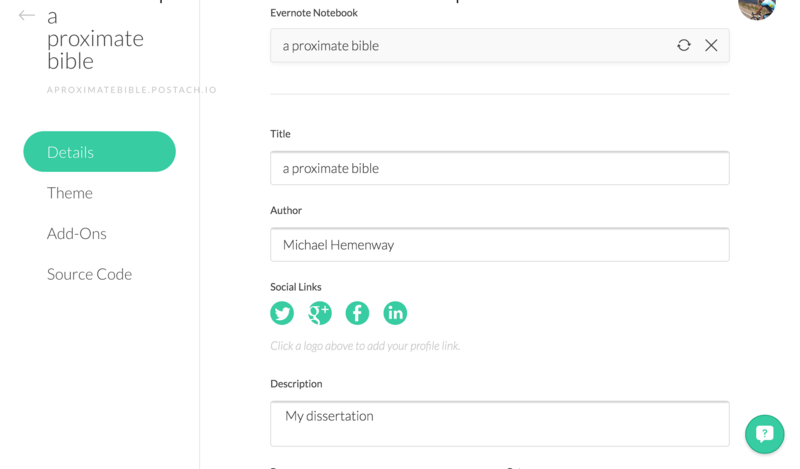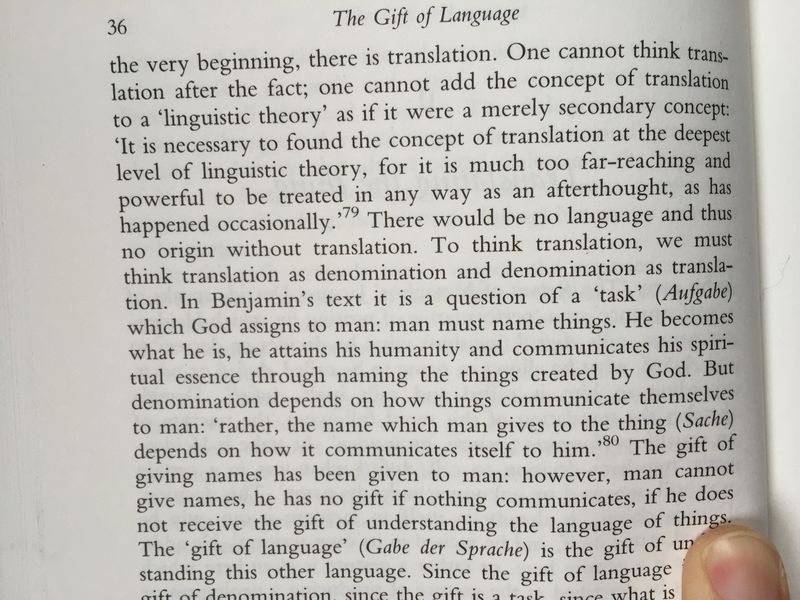I made a simple and small change in the a proximate bible space today. Thanks to Debbie Creamer’s conversation on the post pictured below Difficult Openness, I remembered the conversation in my proposal defense about my possible anxiety regarding authorial presence and authority in this project. When I originally created my postach.io account, the tool I use to push my Evernote compositions to a public web space, I used my twitter handle @textpotential to create the account. Because of this, all of my postach.io sites defaulted to using my twitter handle as the author of posts. Thanks to postach.io, users can configure the author name of each individual site in their account.
 The author field in this site details page is a free form text field, so I could designate the author of the site to be anyone. I applaud postach.io for the flexibility they allow in these settings, but this should remind us that listed names on posts may be misleading. Even though textpotential is a common handle for me in social media spaces, I changed the author of my dissertation space, a proximate bible, to my family name, Michael Hemenway. Does this birth name somehow identify me more legitimately as author(ity)? I’ll leave the discuss of names and ‘real’ identities until another time.
The author field in this site details page is a free form text field, so I could designate the author of the site to be anyone. I applaud postach.io for the flexibility they allow in these settings, but this should remind us that listed names on posts may be misleading. Even though textpotential is a common handle for me in social media spaces, I changed the author of my dissertation space, a proximate bible, to my family name, Michael Hemenway. Does this birth name somehow identify me more legitimately as author(ity)? I’ll leave the discuss of names and ‘real’ identities until another time.
I changed the author designation in this space to clearly signal to my committee and other participants in the project that I have no plans to minimize my presence or voice in the conversations and compositions that make up a proximate bible. In many ways, I am more present in this space than in most of the academic performance media we participate in regularly (conference papers, articles, essays, etc.). As you can see below, this change impacts both the author designation of all posts in the space and the attribution name in my Creative Commons license at the footer of every page.

As I have commented before, I struggle with the language of ‘published’ used here in the author line of posts and in the tagging convention that postach.io uses to make evernote notes available on the web. Perhaps we can have a longer conversation along the way about what ‘publish’ can mean and why I resist the concept. Does the work we are doing here together resemble publishing at all? For now, I will work to modify the a proximate bible theme to use something other than ‘Published’ in the author line of posts. I would love suggestions for langauge that might fit the dispositions of this project, please feel free to offerr suggestions in the disqus space below. I am currently toying with ‘Curated’ or ‘Facilitated.’

See Difficult Openness for some considerations on possible changes to the Creative Commons license on this project. Some advocate for open access as an Attribution only (BY) license. I am considering revoking both the NonCommercial (NC) and the ShareAlike (SA) aspects of the license.
Let’s not forget, a major value of this project is the collaborative making that goes on in the conversations that generate these posts and that show up in the disqus area on the page. So, even if I have more clearly articulated my ‘authorship’ in this space by including my given name in the header of all posts, many questions remain about the relationship between authorship and authority as well as names and identity.
This discussion of authorship and authority surfaces two questions for me related to bible and media. First, are there aspects of internet media authorship and polyvalent identities that might inform our discussions of pseudonymity and anonymity in antiquity? Emily van der Nagel and Jordan Frith offer a useful analysis of identity and -nymities in present social media spaces in ’Anonymity, Pseudonymity, and the Agency of Online Indentity‘. Stay tuned for more on the interaction of this van der Nagel and Frith piece with a formative piece I encountered by Richard A. Cohen years ago exploring Levinasian ethics and humanness on the internet, titled ’Ethics and Cybernetics: Levinasian Reflections.’
Second, how are naming, translation, and the possibility for meaning related? In his book, The Gift of Langauge, Alexander Düttman works with Walter Benjamin’s questions about translation and naming, suggesting, ‘To think translation, we must think translation as denomination and demonimation as translation’ (p. 36).
 Perhaps imagining naming as translation instead of some kind of referentiality offers us some alternative ways of conceptualizing authorship?
Perhaps imagining naming as translation instead of some kind of referentiality offers us some alternative ways of conceptualizing authorship?